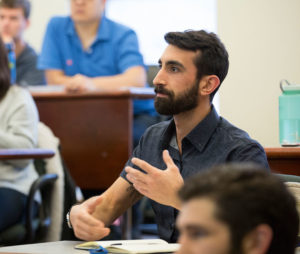In April, I attended the 2017 Ceres Conference in San Francisco, which brought together sustainability leaders from corporations, nonprofits and governments to collaborate on strategies to push sustainability agendas through and beyond the current era. An opening remark by Mindy Lubber, the Ceres president and CEO, set the tone for the conference: “The political winds may have shifted . . . but market forces have not.”
Ceres is a sustainability-focused nonprofit that, like the Erb Institute, embraces the idea of global sustainable enterprise. Founded in Boston in 1989, it uses strategic advocacy to help Fortune 500 companies and leading investors integrate positive environmental, social and governance practices into their core operations. It focuses specifically on clean energy and sustainable food and water initiatives. Lubber’s opening comment was not meant to imply that markets are negatively “stuck,” but it was instead a testament to the work that Ceres and other sustainability organizations, institutes and individual actors have done to measurably change the way in which the economy is working, particularly through their paradigm-shifting work with institutional actors.
If this sounds like too rosy an outlook to you, you’re right—simply getting pension funds and large companies like Coca-Cola, PG&E and General Motors to commit to specific sustainability activities just scratches the surface of creating a more sustainable brand of capitalism, especially when more systemic issues, like the quantification of GDP, go on unchecked. But having many of these economy-shaping players at the same table as sustainability pioneers like Lubber—and California Governor Jerry Brown, who made an appearance as the conference’s closing speaker—is necessary to begin to change the way corporations’ and their shareholders’ expectations are set and managed.
After two packed days of plenaries, breakout sessions and networking, I left the conference with three main takeaways:
- As Erbers and aspiring sustainability leaders, none of us can afford to ignore institutional players. Regardless of where we start our careers, or whether we want to work at a small nonprofit, a start-up or a large corporation, I believe that we all have a responsibility to understand how sustainability is being promoted at the most complex corporate levels—because it affects all the work we do, and people’s lives around the world.

- We need to get out more! The Erb Institute and the University of Michigan do an outstanding job of bringing resources and sustainability leaders to us, and with the rigors of the MBA/MS experience, it’s tempting to stay in Ann Arbor throughout the year. But entire regional governments, like California’s, are taking a stand for the issues to which most of us are so deeply committed, and industry events in sustainability hubs like San Francisco draw an immense number of practitioners who are living what we study and discuss on a daily basis.
What could this look like? A great place to start is with second- and third-year Erb students, many of whom come back to Ann Arbor having completed sustainability-related internships across the country. In the 10-12 weeks that they’re gone, these students are able to plug into their new local sustainability ecosystems, which often involves accessing and attending specific regional initiatives and events related to their projects. It would be great if we could make these national resources clearer to first-year Erbers in particular, as they begin to plot their career journeys throughout the institute.
- The Erb community is outstanding. As one of less than ten students at a conference of many hundreds of people, an Erb alum (2015) took time to find me at a networking event, was genuinely interested to learn about everything I had been involved with during my first year and then proceeded to introduce me to her boss—another sustainability consultant, like her, and an SEAS alum—and to anyone else I wanted to meet. I was shocked, and so grateful for her instant, warm and thoroughly helpful support.
Thanks to the Erb Institute and the Cool Project fund for making this experience possible for me. It was an outstanding and highly relevant close to my first year.
